

Flickr (James Jaeger Dmtry.: CORPORATE FASCISM: The Destruction of…) Sone & Freenet Screenshot for PT1.0 of this pearlpage. CORPORATE FASCISM: The Destruction of America's Middle Class. Fiat Empire. FIAT EMPIRE: Why the Federal Reserve Violates the U.S. Constitution. Fiat Empire. The Congress shall have Power To coin Money, regulate the Value thereof, and of foreign Coin, and fix the Standard of Weights and Measures; No State shall make any Thing but gold and silver Coin a Tender in Payment of debts.
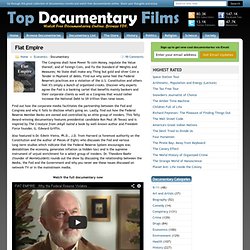
Find out why some feel the Federal Reserve's practices are a violation of the U.S. Constitution and others feel it's simply a bunch of organized crooks. Discover why experts agree the Fed is a banking cartel that benefits mainly bankers and their corporate clients as well as a Congress that would rather increase the National Debt to $9 trillion than raise taxes. Find out how the corporate media facilitates the partnership between the Fed and Congress and why it fails to disclose what's going on. Lastly, find out how the Federal Reserve Member Banks are owned and controlled by an elite group of insiders. Also featured is Dr. History of U.S. Gov’t Bailouts. By Jesse Nankin and Krista Kjellman Schmidt, ProPublica, Updated April 15, 2009 The circles below represent the relative size of each U.S. government bailout of American corporations (and one city), calculated in 2008 dollars.
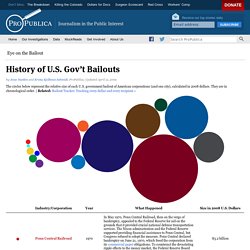
They are in chronological order. | Related: Bailout Tracker: Tracking every dollar and every recipient » Bailout, wikipedia. A bailout is a colloquial term for giving a loan to a company or country which faces serious financial difficulty or bankruptcy.
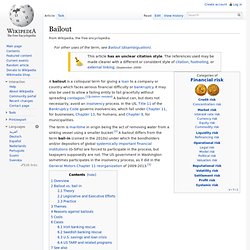
It may also be used to allow a failing entity to fail gracefully without spreading contagion.[1][citation needed] A bailout can, but does not necessarily, avoid an insolvency process. In the US, Title 11 of the Bankruptcy Code governs insolvencies, which fall under Chapter 11, for businesses, Chapter 13, for humans, and Chapter 9, for municipalities. The Bailout Reader - Mises.org. Rboc_memberbanks_19140527. Federal Reserve Districts and Banks. Federal Reserve System. The Federal Reserve System (also known as the Federal Reserve, and informally as the Fed) is the central banking system of the United States.
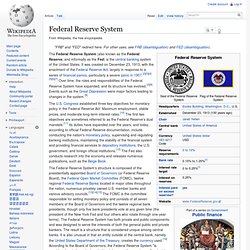
It was created on December 23, 1913, with the enactment of the Federal Reserve Act, largely in response to a series of financial panics, particularly a severe panic in 1907.[2][3][4][5][6][7] Over time, the roles and responsibilities of the Federal Reserve System have expanded, and its structure has evolved.[3][8] Events such as the Great Depression were major factors leading to changes in the system.[9] The Website of Political Research Associates. War Is the Health of the State (Randolph Bourne) To most Americans of the classes which consider themselves significant the war [World War I] brought a sense of the sanctity of the State which, if they had had time to think about it, would have seemed a sudden and surprising alteration in their habits of thought.
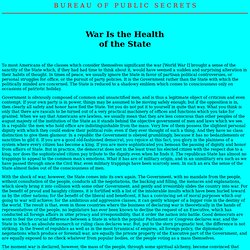
In times of peace, we usually ignore the State in favor of partisan political controversies, or personal struggles for office, or the pursuit of party policies. It is the Government rather than the State with which the politically minded are concerned. The State is reduced to a shadowy emblem which comes to consciousness only on occasions of patriotic holiday. Government is obviously composed of common and unsanctified men, and is thus a legitimate object of criticism and even contempt. If your own party is in power, things may be assumed to be moving safely enough; but if the opposition is in, then clearly all safety and honor have fled the State. Part 1 of the unfinished essay: "The State" - Antiwar.com.
Randolph Bourne. Randolph Bourne Randolph Silliman Bourne (May 30, 1886 – December 22, 1918) was a progressive writer and "leftist intellectual"[1] born in Bloomfield, New Jersey, and a graduate of Columbia University.
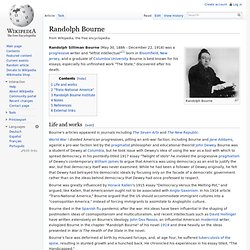
Bourne is best known for his essays, especially his unfinished work "The State," discovered after his death. Life and works[edit] Blowback (intelligence) Blowback is unintended consequences of a covert operation that are suffered by the aggressor.
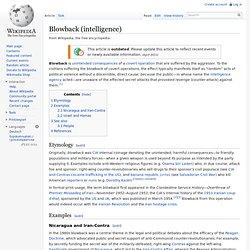
To the civilians suffering the blowback of covert operations, the effect typically manifests itself as “random” acts of political violence without a discernible, direct cause; because the public—in whose name the intelligence agency acted—are unaware of the effected secret attacks that provoked revenge (counter-attack) against them.[1] Originally, blowback was CIA internal coinage denoting the unintended, harmful consequences—to friendly populations and military forces—when a given weapon is used beyond its purpose as intended by the party supplying it.
Examples include anti-Western religious figures (e.g. Article One of the United States Constitution. Act for the Relief of the Poor 1601. The Poor Relief Act 1601 (43 Eliz 1 c 2) was an Act of the Parliament of England.
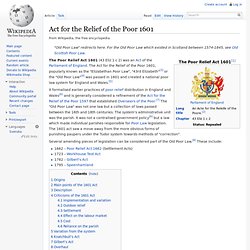
The Act for the Relief of the Poor 1601, popularly known as the "Elizabethan Poor Law", "43rd Elizabeth"[3] or the "Old Poor Law"[4] was passed in 1601 and created a national poor law system for England and Wales.[5] It formalised earlier practices of poor relief distribution in England and Wales[6] and is generally considered a refinement of the Act for the Relief of the Poor 1597 that established Overseers of the Poor.[7] The "Old Poor Law" was not one law but a collection of laws passed between the 16th and 18th centuries.
The system's administrative unit was the parish. It was not a centralised government policy[6] but a law which made individual parishes responsible for Poor Law legislation. English Poor Laws. The English Poor Laws[2] were a system of poor relief which existed in England and Wales[3] that developed out of late-medieval and Tudor-era laws being codified in 1587–98.
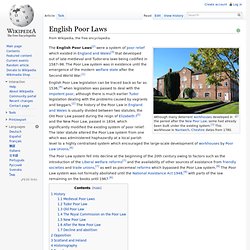
The Poor Law system was in existence until the emergence of the modern welfare state after the Second World War.[1] English Poor Law legislation can be traced back as far as 1536,[4] when legislation was passed to deal with the impotent poor, although there is much earlier Tudor legislation dealing with the problems caused by vagrants and beggars.[2] The history of the Poor Law in England and Wales is usually divided between two statutes, the Old Poor Law passed during the reign of Elizabeth I[5] and the New Poor Law, passed in 1834, which significantly modified the existing system of poor relief. History[edit] Medieval Poor Laws[edit] The 1601 Elizabethan Poor Law. Before the Reformation, it was considered to be a religious duty for all Christians to undertake the seven corporal works of mercy.
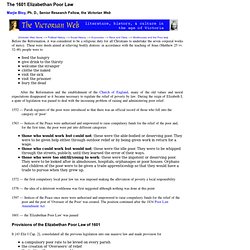
These were deeds aimed at relieving bodily distress: in accordance with the teaching of Jesus (Matthew 25 vv. 32-46) people were to. The Poor Law. U.S. Term Limits, Inc. v. Thornton. U.S. Term Limits, Inc. v. Thornton, 514 U.S. 779 (1995),[1] was a case in which the Supreme Court of the United States ruled that states cannot impose qualifications for prospective members of the U.S. Term limits in the United States. Term limits in the United States apply to many offices at both the federal and state level, and date back to the American Revolution.
Term limits, also referred to as rotation in office, restrict the number of terms of office an officeholder may hold. Historical background[edit] Pre-constitution[edit] U.S. Term Limits, Inc. v. Thornton, 514 U.S. 779 (1995). NOTICE: This opinion is subject to formal revision before publication in the preliminary print of the United States Reports. Readers are requested to notify the Reporter of Decisions, Supreme Court of the United States, Washington, D.C. 20543, of any typographical or other formal errors, in order that corrections may be made before the preliminary print goes to press. Nos. 93-1456 and 93-1828 v. RAY THORNTON et al. WINSTON BRYANT, ATTORNEY GENERAL OF ARKANSAS, PETITIONER 93-1828. Tariff of 1789.